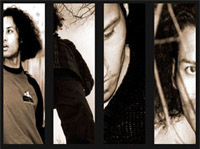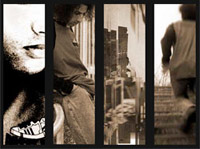| Less Structure | |
 |
1995 was a vintage year for LPs. We were spoilt for choice, what with the Sea & Cake, Raekwon,
T-Power, Pram, Genius, Springheel Jack, Wagon Christ, Mobb Deep, Spain, Red Snapper, Patrick
Pulsinger, LaBradford, Speedy J, and plenty more. Yet, with the benefit of hindsight, I'd argue that
the best of the bunch, in terms of durability and inventiveness, has to be Bedouin Ascent's 'Music
For Particles', sadly one of the more neglected records of the year. I'd also argue that its importance
lies in the fact that it's so elusive: neither jungle nor trip hop, neither ambient nor dance floor
friendly. Also, thankfully, it's not blighted by the curse of club culture LPs. You know, the dreaded
displays of dilettantism and diversity, where DJs have to prove what open-minded souls they really
are. I mean, look at how bad the David Holmes LP was. Sure, some like Vibert and Aphex can turn
their hand to anything, but most people just come across as phoney and fickle. However, Kingsuk Biswas in his Bedouin Ascent guise has come up with something that opens up new diections for electronic music. The Wire have already tried to label it as part of the new complexity, which is obviously a reference to Bis' use of polyrhythms and scattergun beats. Label mate Luke Vibert has said that the insane beats are too much for his head, while others have said they wouldn't know how to even start dacncing to it. Indeed Bis has been particularly scathing about soothing sounds, particularly drum'n'bass' alarming decline into flabby fusion and flotsam. Bis' beat are as broken as they come, but the chances are they owe more to the European avant garde and Indian traditions than Detroit classicism. Who cares? It's simply invigorating, and I can't wait to see where he goes next. |
 |
The implication has been that Bis has benefitted from being a cultural outsider, sitting on the
sidelines lapping everything up. Perhaps most intriguingly, constant reference has been made to
Bis' early exposure to dub, listening to David Rodigan's Roots Rockers on Capital Radio at the end
of the '70s. Put that together with Rupert Parkes speaking about how important it was to his musical
development listening to Gilles Peterson's earliest shows on Radio London in the early/mid '80s and
you can begin tracing the story of specialist radio shows in the London area, before the pirates
returned. Other shows worth mentioning are Greg Walker's Soul Spectrum on Capital and Stuart
Henry's show on Radio London playing all the mad rockabilly and r'n'b obscurities, with the
stripped down energy level easily matching the best of punk. Mind you, just as mental was when the
network was given over to the Asian sounds. I never had a clue what they were playing, but it
sounded wild. Anyhow, there's some stories to tell there, but none of them have owt to do with why
'Music For Particles' is good. I suppose it's just because I remember those infamous hecklers
shouting at Huggy Bear: "Less structure." © Kevin Pearce, 1996. |